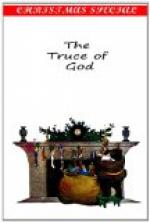Gilbert made no direct reply, nor did he return the glance of his friend, which he well knew was upon him.
“I could wish,” he began, after a considerable pause, “before leaving your hospitable roof, to have expressed to the Lady Margaret my deep sense of the interest she deigned to display in my regard, and which I fear has done more to soften my feelings toward her father, than the nobler and holier motive you have mentioned.”
There was a humility in this that pleased the good missionary; but he saw with pain and uneasiness the direction which the ardent mind of the youth was evidently taking, and instantly rejoined:
“Did you know the Lady Margaret better, you would spare yourself that regret. In her charitable attention to your wants, she overcame a natural repugnance to yourself. She would rather miss than receive any return you can make, and is always more inclined to set a proper value upon the solid and eternal recompense of God, than attach any importance to the empty and interested gratitude of man.”
Gilbert’s eyes were bent again upon the Lake of Constance. They were now at the foot of a long, high hill, which they began to ascend in silence. Gilbert pressed his horse rather swiftly up the gradual ascent, and they soon gained the summit.
“What is the Danube to that splendid lake!” cried the mercurial stripling; “and what is there in all the lordship of Stramen to vie with this!”
The view now opened might excuse his excitement, even in a less interested person. The Castle of Hers, though built for strength, presented a very different appearance from that of Stramen: its outline was light and graceful, and it seemed rather to lift up than cumber the tall hill that it so elegantly crowned. It was situated upon the border of the lake, which, by trouvere and troubadour, in song and in verse, in every age and in every clime, has been so justly celebrated. A few miles to the southwest the mighty Rhine came tumbling in; who, as the German poets say, scorns to mingle his mountain stream with the quiet waters of the lake. We will attempt no further description, for fear of spoiling a finer picture, which must already exist in the eye of the reader, created by more skilful hands.
As the horsemen neared the castle, they saw a knight, followed by a few men, dashing down the hill. Gilbert knew his father, and hastened to meet him. Their meeting was manly and cordial. The baron stopped but to embrace his son, and hastened to welcome Father Omehr. He dismounted, and imprinted a kiss upon the old man’s still vigorous hand.
“I should be childless now,” he said, “but for your kindness; and you know that words would but mock my feelings.”
The tears in the baron’s eyes expressed more than a long oration.
Father Omehr only replied, with a laugh, “You must blame your son’s indiscretion, and not applaud me!” Thus saved from a formal and unsatisfactory conversation, the knight remounted his horse and led the way to the castle.




